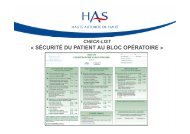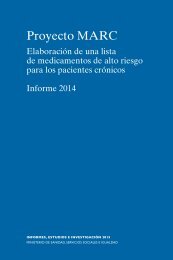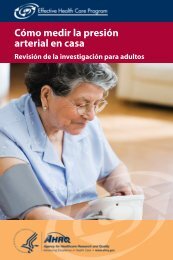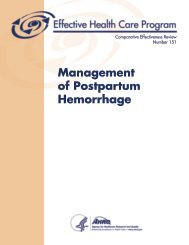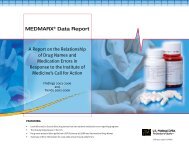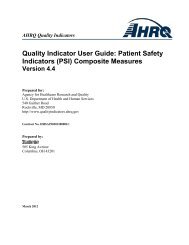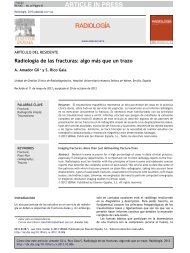for Invasive Procedures (NatSSIPs)
Z3q53
Z3q53
Create successful ePaper yourself
Turn your PDF publications into a flip-book with our unique Google optimized e-Paper software.
OFFICIAL<br />
safety steps printed permanently upon them in addition to printed checklists to act as<br />
aide memoires and to ensure that every safety step in LocSSIPs is properly<br />
completed <strong>for</strong> every patient undergoing invasive procedures. Organisations do not<br />
need to document every detail of every step per<strong>for</strong>med in every LocSSIP, as it is<br />
more important that the checks are conducted properly than that the per<strong>for</strong>mance of<br />
every step is recorded. Organisations should work with commissioners and<br />
regulators to determine an appropriate level of detail <strong>for</strong> records that will support<br />
audit and investigation while not placing an intolerable burden upon procedural<br />
teams.<br />
3.5.3 Accountability and responsibility<br />
Every team member is responsible <strong>for</strong> the delivery of safe care<br />
Organisational leaders, i.e. Trust Boards or equivalent, shall be ultimately<br />
responsible <strong>for</strong> the creation of LocSSIPs, their implementation, governance, audit<br />
and modification, and will be accountable <strong>for</strong> these to Clinical Commissioning Groups<br />
and to the Care Quality Commission. Multidisciplinary procedural teams, e.g.<br />
operating theatre teams, to include medically qualified, registered and non-registered<br />
practitioners, will be responsible <strong>for</strong> the development, implementation and continuous<br />
appraisal of the safety and efficacy of LocSSIPs, working with patient groups where<br />
appropriate. The line of accountability will pass up from these teams through clinical<br />
and non-clinical managers to the Trust Board or equivalent. However, the<br />
responsibility <strong>for</strong> ensuring that the LocSSIPs are followed accurately <strong>for</strong> every patient<br />
will be the responsibility of every member of the procedural team. Those members of<br />
the team who are registered healthcare professionals will be accountable both to<br />
their registering bodies and to their employers. Those members of the team who<br />
work in non-registered roles will be accountable to their employers. The fundamental<br />
basis of the delivery of LocSSIPs in the patient pathway is the sharing of<br />
responsibility between every member of the procedural team. When a document is<br />
signed as indicating that a step in a LocSSIP has been per<strong>for</strong>med by a member of a<br />
procedural team, that member is signing on behalf of the whole team, and every<br />
member of the team there<strong>for</strong>e shares the responsibility <strong>for</strong> the per<strong>for</strong>mance of the<br />
LocSSIP, while sharing accountability <strong>for</strong> its full completion. The basis of safe care is<br />
teamwork, and the aim of both <strong>NatSSIPs</strong> and LocSSIPs is to promote and develop<br />
teamwork.<br />
3.5.4 Organisational culture and teamwork<br />
Effective teamwork in a supportive environment makes patient care safer<br />
Leaders of organisations providing NHS-funded care should take positive steps to<br />
ensure that LocSSIPs are introduced and managed within a culture of openness and<br />
transparency in which any member of any procedural team knows that they can<br />
speak up to express concerns about the process or patient safety at any time in the<br />
patient or procedural pathway. Although this document does not demand the<br />
implementation of a “Stop the Line” system similar to that used in vehicle<br />
manufacture, the implementation of such an approach, when it is safe, is encouraged<br />
within organisations. There must also be openness in the analysis of audit data of<br />
18



